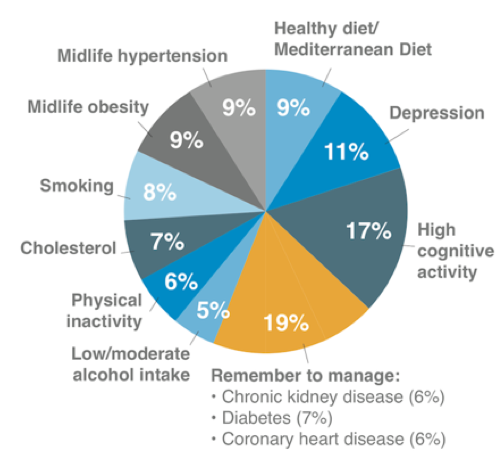Cognition and Dementia
Crossroad
Research theme: Rehabilitation and Prevention
Clinical pillar: Cognition and Dementia
Our aim is to create insight into the prevention, aetiology, treatment, care and support of cognitive dysfunction by conducting observational, interventional and implementation research in the general adult population.
Unique contributions and highlights
Research line staff members are active contributors to De Maastricht Studie (DMS), a comprehensive phenotyping study on 10,000 people aged 40-75 years in the Maastricht and Heuvelland region, including data on medical and lifestyle factors, cognitive function and brain MRI. DMS is becoming a leading resource for our epidemiological work into determinants of brain health and underlying biological pathways, including the role of maintenance factors of neural reserve.
In addition, The Maastricht Ageing Study (MAAS) is an observational cohort study with repeated assessments of health, lifestyle, cognitive functions and incident dementia spanning the completely adult age range. MAAS continues to be a major source for new studies into determinants and course of cognitive ageing across the adult age range, including temporal studies into timing of exposure and onset of cognitive change. Studies are included in several large research consortia such as the ‘Cohort Studies of Memory in an International Consortium (COSMIC)’ harmonisation project and the “Geoscience and health cohort consortium (GECCO)” into shared environmental risk factors, allowing high-powered analyses of determinants of cognitive ageing and dementia.
Our main aim is to translate studies on modifiable risk factors into new preventive and public health strategies that serve the general population. We developed the ‘Lifestyle for Brain Health’ (LIBRA) index that shows someone’s room for improvement by adopting a healthy lifestyle. LIBRA has been implemented in the ‘MijnBreincoach’ app and the ‘We zijn zelf het medicijn’ public health campaign, which have both been adopted by (inter)national partners. In addition, we (co-)lead intervention studies into lifestyle-based primary and secondary prevention of cognitive decline in the FINGER-NL trial and the ABOARD-project.

The Mijn Brein coach app.
Psychosocial research focuses mainly on development, evaluation and implementation of eHealth interventions. The blended care self-management program 'Partner in Balance' (PiB) was developed to teach relatives of people with Dementia and Parkinson's disease in an early phase of the adaptation process skills to prevent overburdening at a later stage. It was proven effective and has received the Dutch Medical Inspiration price for highly potential interventions. Its cost-effectiveness is currently being evaluated. The program is being implemented (inter)nationally in the senior-friendly communities project in the EU region Meuse-Rhine and in the INDUCT project that has developed an Interdisciplinary Training Network for Dementia Using Current Technology. It has trained 15 PhD students as experts who can translate needs in people with dementia to effective supportive technologies. It will be continued in a follow up project DISTINCT (https://www.dementiadistinct.com).
Our focus is also to improve (access to) post-diagnostic care. The European Actifcare project aimed to understand determinants of access to formal dementia care using mixed methods (European cohort and interviews/focus groups, interaction with decision-makers). It revealed inequity in access to care, which was associated with lower quality of life. One of the recommendations was to adopt a key contact person (e.g. case manager). The COGNISANCE project will develop and implement a campaign to improve post-diagnostic support in an international context (including Australia, Canada, UK, the Netherlands and Poland). This is done with close involvement of people with dementia, informal carers and professional care providers.
The S-DeciDeD project focuses on improving joint decision-making regarding the diagnosis of Alzheimer's disease in general practice. This is of particular importance because of the increasing efforts in early detection of AD pathology through novel biomarker/imaging techniques, which provides information on the probability to develop dementia.

LIBRA index showing each risk and protective factor’s contribution to the total modifiable risk.


